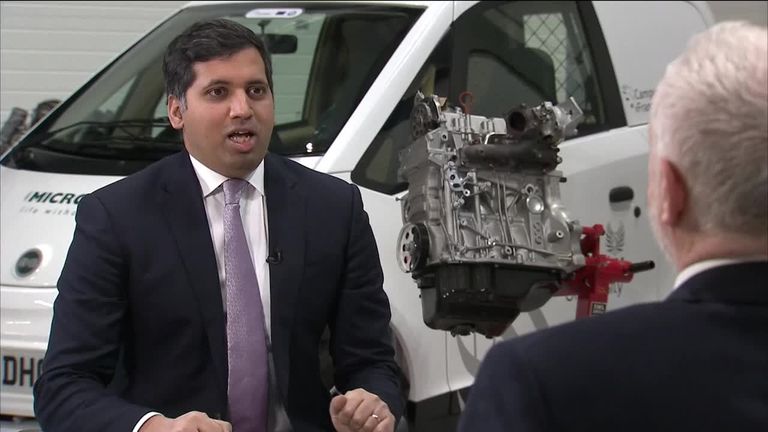Globetrotter Liam Fox to slam Jeremy Corbyn's customs union bid
The International Trade Secretary, who has flown 290,000 miles in 18 months, will argue Britain needs "flexibility and agiity".
Tuesday 27 February 2018 02:37, UK
Jeremy Corbyn's customs union policy would leave the UK with "one arm tied behind our back" in trade talks, according to Liam Fox.
In the fifth of six "Road to Brexit" speeches by senior Cabinet ministers, the International Trade Secretary will say staying in a customs union with the EU would be "a complete sell out of Britain's national interests".
Dr Fox's speech coincides with the disclosure he has flown 290,000 miles - further than a trip to the Moon - to countries where he hopes to do free trade deals after Brexit.
Analysis by The Guardian shows Dr Fox has travelled to almost 40 different countries since taking over at the Department for International Trade in July 2016.
His destinations include nations where trade with the UK is small, such as Vietnam, Panama and Uganda, as well as major trading partners such as the US, Germany and the Netherlands.
Dr Fox's speech comes 24 hours after Mr Corbyn, in a major shift in Labour policy, backed the UK staying in a customs union with the EU after Brexit.
But the International Trade Secretary, in a speech at the headquarters of financial information company Bloomberg in the City of London, will insist the pattern of trade is changing.
"We cannot allow the practices and patterns of the past to constrain the opportunities of the future," Dr Fox, an arch-Brexiteer in the 2016 referendum campaign, will say.
:: Everything you need to know about customs union
Now, 20 months after the Leave vote, Dr Fox will say trade is changing because 57% of Britain's exports of goods and services are now to outside the EU, compared with only 44% in 2005.
And while the UK's EU exports are still dominated by goods, non-EU exports are evenly split between goods and services, Dr Fox will state.
"Our approach should not be premised on simply identifying how much of our current relationship we want to keep, but what we need to prosper in a rapidly changing global environment," he will say.
Dr Fox will highlight three disadvantages for the UK remaining in a customs union with the EU, as proposed by Mr Corbyn.
"First of all, for goods, we would have to accept EU trade rules without any say in how they were made, handing Brussels considerable control of the UK's external trade policy," he will say.
"Secondly, it would limit our ability to reach new trade agreements with the world's fastest-growing economies.
"And thirdly, it would limit our ability to develop our trade and development policies that would offer new ways for the world's poorest nations to trade their way out of poverty."
Dr Fox will add: "As rule takers, without any say in how the rules were made, we would be in a worse position than we are today. It would be a complete sell out of Britain's national interests.
"A customs union would remove the bulk of incentives for other countries to enter into comprehensive free trade agreements with the UK if we were unable to alter the rules in whole sectors of our economy, as Turkey has now discovered."
And the Cabinet minister will claim: "The inevitable price of trying to negotiate with one arm tied behind our back is that we would become less attractive to potential trade partners and forfeit many of the opportunities that would otherwise be available to us."
Dr Fox will also use his speech to argue that future global trade will not be determined through rigid trade mechanisms.
"There is a tendency among some nations to cling to the 'known' trading mechanisms more suited to the structures of the past than the digital age of the future," he will state.
"Flexibility and agility, then, are the key to any future trade policy.
"The ability to react quickly to new developments, to explore new opportunities and to nurture fledgling industries that will be the key to growth and prosperity in the coming years.
"That is why my Department is pursuing a more flexible approach to our country's trading future.
"We will consider multi-country alliances of the like-minded right down to bilateral arrangements.
"To do this, we need the ability to exercise a fully independent trade policy.
"We have to maximise overall trading opportunities for the UK and secure the prosperity of our people."






